ON WELL-OILED WHEELS
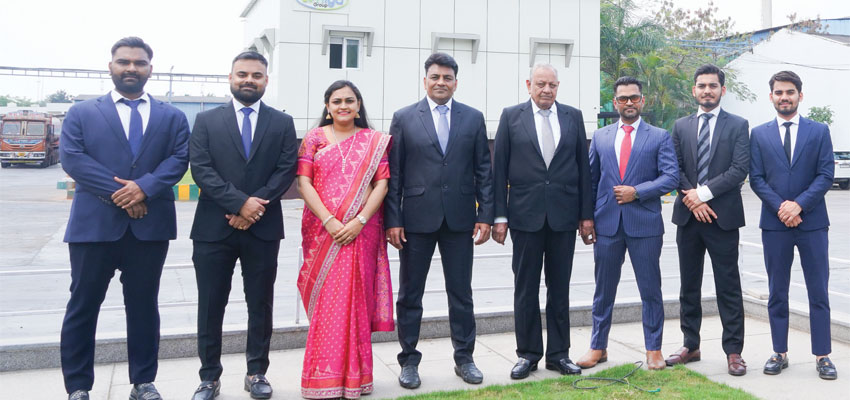
With his sheer acumen, diehard determination and uncompromising dedication, Kanhaiyalal Lohiya etched his entrepreneurial journey starting as a small-time edible oil trader, to opening an edible oil mill in 1987, which over the 37 years has grown to a business that is into edible oil refining and marketing. Today, Lohiya Group has also expanded to verticals like green energy, confectionary and real estate. The family business group is managed by three generations, and they are carrying forward the same vision and the legacy.
Their sunflower oil brand “Gold Drop” launched in 1995, has become a household name in the southern states of India. It has won the prestigious ‘Asia’s Most Trusted Brand 2019’, the only brand to win this award in Asia, in this segment, awarded by International Brand Consulting Corporation, USA.
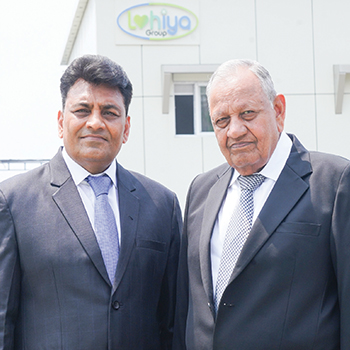
Lohiya Industries was first established in 1987 at Gaganpahad, Telangana. With a humble beginning, starting with a production of 30 tons per day (TPD), the current refining capacity has touched 1550 TPD. Today, its market area is widely spread across Telangana, Andhra Pradesh, Karnataka, Odisha, Chhattisgarh, Tamil Nadu, Goa and Maharashtra. It has become one of the leading edible oil manufacturers in India, with an annual turnover of Rs. 4,300 crores. Lohiya Group has four refineries located at Gaganpahad, Mankhal, Kakinada and Krishnapatnam (Nellore).
In an exclusive interview with Corporate Citizen, Kanhaiyalal Lohiya, founder and chairman, Lohiya Group and Mahaveer Lohiya, managing director, Lohiya Group, take us through their humble beginnings, their legacy in the FMCG sector, growth strategy and future vision—exemplifying entrepreneurial excellence, generational leadership and strategic innovation
"Trustworthiness in business ethics, is about being reliable and dependable, ensuring that actions and promises are upheld consistently, and it is the role of transformational leadership in business growth"
— Kanhaiyalal Lohiya
Game-Changing Innovator
As one of the first generational entrepreneurs in the edible oil sector of India, Kanhaiyalal Lohiya, the founder chairman of Lohiya Group, had exposure to business concepts and nuances quite early in his career. Today he is considered among one of the most successful business people of independent India. He is the chief force that has been essentially responsible for bringing the organisation to its present exalted stature. He takes us through his entrepreneurial journey
Corporate Citizen: Tell us about your modest roots in Janjeela, Rajasthan, to how you came to Hyderabad, graduated in electrical engineering and transitioned to starting a small oil-trading business, from where your success started.
Kanhaiyalal Lohiya: I was born in a small village Janjeela, in Parbatsar Tehsil of Nagaur district, Rajasthan. We are from the Marwari community, and my parents were into farming and small trading business. I am the fifth among the eight siblings in our family.
My primary schooling happened in the village school, after which for my secondary education I had to travel seven kilometres to a school in the neighboring village. It was a 14kms walk up-and-down through a dusty dirt road. For my higher secondary education, I came to Hyderabad city in the year 1962, getting admission into 10th class of Agarwal Multi-purpose School. Then I graduated in electrical engineering, from Nagarjuna Engineering College, which was affiliated to Osmania University, in Hyderabad. My younger brother, Satnan Lohiya, was pursuing mechanical engineering from Warangal University. To do something different, I chose the electrical engineering stream.
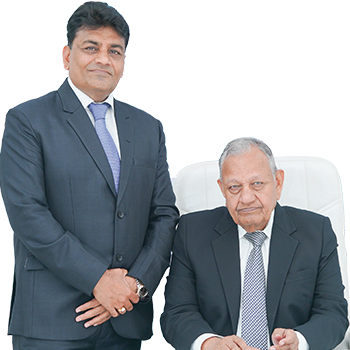
During my engineering days, the university campus saw many protests related to the Telangana agitation. Due to these protests and instability, our engineering programme got delayed by a year. In this period, as I was most of the time home, I started a small oil-trading shop, in Shamsheergunj area, in Hyderabad. It was a 10x10 square feet shop, which I took on rent for 10 rupees per month. In the initial months, I would sell around 600 (15 litres) tin oil cans. I would earn around one-rupee profit behind each can, which amounted to around Rs.600 monthly profit. At that time Rs.600 was big money.
I went on to do good business of oil trading. Later, I thought of taking a bigger entrepreneurial jump and started an oil mill, in Shamsheergunj. I took a space on rent for Rs.650, where we had our grinding mill to crush groundnut seeds. From groundnut oil, I diverted to manufacturing castor oil—Telangana at that time was considered to be one of the world’s biggest market for castor seeds. We would crush around 3000 bags of castor seeds every day. Our castor oil was also transported to Mumbai, from where it was exported. At that time, we became so known as castor oil manufacturer that farmers from nearby 50 villages would come to us to supply castor seeds.
As the castor oil mill was doing good, I thought of getting into sugar manufacturing. So, we bought a nearby khandsari sugar factory, for 8 lakh rupees. Khandsari is a type of unrefined raw white sugar made from thickened sugar cane syrup—it is not bleached, and contains harmful chemicals and additives. I was not alone to buy this sugar factory—it was a partnership venture with few of my brothers. The factory went on to become the topmost manufacturer of khandsari sugar in Telangana.
Then I moved to start edible oil refinery, between 1991-1993. The idea of starting an oil refinery unit came while running the castor oil mill at Gaganpahad, near Hyderabad. A person who was starting a refinery unit nearby our castor oil mill, happen to meet me one day, and he suggested to me that as I have so much open space, I could easily install an oil refinery unit. This is how the idea was born and I installed an oil refinery unit at Gaganpahad.
"Government is taking efforts, by starting the National Mission on Edible Oils (NMEO) to boost domestic production and reduce import dependence, and increase the area under oil palm cultivation, but unless we gain the trust of farmers and assure returns, it’s not possible"
— Kanhaiyalal Lohiya
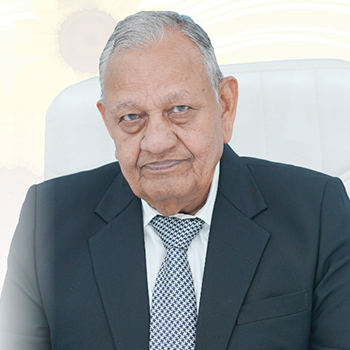
We wanted to get the true essence of our pure, very light quality oil, through our brand name, and hence the brand name “Gold Drop” - where every drop of oil shines like pure gold.
Our brand name and pack design was well received and liked by the customers. As time went by, our Gold Drop sales went on increasing, despite competition from big MNCs. I worked with only one motive—to give the best quality and purest sunflower oil to my customers. Today I am in this position, because I have my customers’ loyalty and faith in the quality we provide.
While doing this oil business, I had understood one thing that India will always face cooking oil shortage. To cover that shortage, edible oil will be imported from abroad. For the oil imports to enter India, the only channel will be the sea ports. Therefore, I made it a point, that I will start an oil factory near a port. So, I started my first oil factory in Kakinada, a port city in Andhra Pradesh state.
CC: You had a humble origin and initial hiccups in the earlier stages of Lohiya Industries. What kept you going?
During the time when we started, refined and pure sunflower oil was hardly available in the market, except for one or two brands. I was adamant to give the same quality and purity at a lesser price to the customers. I have never compromised on anything in my life, and that’s what has kept me going ahead in my business and life. Our customers kept on increasing and having faith in our brand for its quality and purity, and we have never compromised on the quality parameter.
At times, we had more demand than our production capacity. Customer trust is vital for marketing success—it is critical and I measured it right.
CC: India is the world’s 4th-largest edible oil economy, after the USA, China and Brazil, but it heavily relies on imports to meet its demand, with around 70% of its requirements sourced from other countries like Indonesia, Malaysia and even Ukraine. And, the imports are dollar-denominated.
Initially, we would source crude edible oil for our refinery, from around Telangana state. Over the years, the demand for refined cooking oil in India has risen manifold. To meet that demand, we have to heavily rely on imports from abroad. The crude edible oil is delivered through ships and end up at our sea ports. That’s the reason we opened our refinery plant in Kakinada.
India is trying to be self-reliant and cut on in these imports of crude edible oil. Increasing palm cultivation in India, is one of the dream projects of this ruling government. Palm cultivation is also happening in Telangana. We also have been given the target of cultivating palm trees on one lakh acre of land, but we have hardly crossed 10 thousand acres till now. Our efforts are going on to encourage the farmers. We have our palm tree nurseries, for which we have imported palm seeds from abroad. Once these palm trees grow to the height of three feet, we transfer it to farm lands. If the farmers provide their land for palm cultivation, only then we can transfer these palm trees.
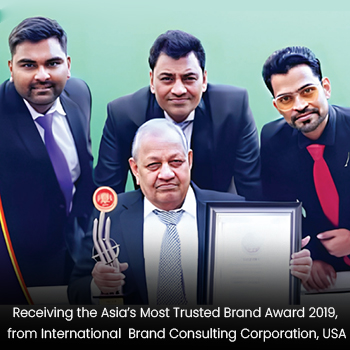
It is not possible for India to completely stop the import of edible oil and be self- reliant. In a country where 70 per cent of crude edible oil is imported from abroad, how is it possible that we can become self-reliant. We are able to meet only 30 per cent of our requirement, and to increase that we need to take some drastic steps to make palm tree cultivation as a cash crop among the farmers. Government is taking efforts, by starting the National Mission on Edible Oils (NMEO) to boost domestic production and reduce import dependence, and increase the area under oil palm cultivation, but unless we gain the trust of farmers and assure returns, it’s not possible.
"We Marwaris are known for adapting to local customs and integrating into new communities, and also preserve the aspects of our heritage and tradition. We have found ways of keeping our culture and tradition alive"
CC: What is the role of transformational leadership in business growth?
I have always maintained business relationship on the pillars of trust. Trustworthiness in business ethics, is about, being reliable and dependable, ensuring that actions and promises are upheld consistently, and it is the role of transformational leadership in business growth. That is what I stand for and that is what everyone know me for.
CC: Why did you chose to producing sunflower oil and did not diversify into producing other popular oils in India?
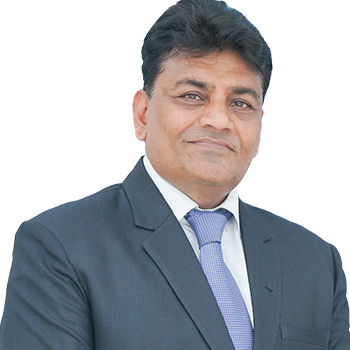
Along with sunflower oil, we had started refining groundnut oil also, but groundnut refined oil has very less demand in the South India; it is popular in the north. And logistics-wise it was not viable for us to transport it to northern markets. That is the reason why we stopped the production of groundnut oil. Even in case of palm oil, initially we were taking around ten thousand tons of palm oil, but then while refining it we did face many technical problems, for which we stopped refining and producing the same.
CC: You belong to the Marwari community, which is known for commercial success. How do you retain connection with your mother-state Rajasthan, while maintaining your social and cultural uniqueness, staying in Hyderabad?
Of course I still maintain close connection with my village in Rajasthan, where I was born and did my initial schooling. When wealth favoured me, first thing I did was I built a higher secondary school in Janjeela. I made the government to allot a name for the school, after my father’s name - Pusharamji Godulalji Lohiya Government High School. Bought around six-acre land, built the school building, computer lab and a playground. Today children from not only Janjeela, but also surrounding villages come to study in that school. I also financially helped in renovating a dilapidating Lord Hanuman temple in Janjeela village.

We Marwaris are known for adapting to local customs and integrating into new communities, and also preserve the aspects of our heritage and tradition. We have found ways of keeping our culture and tradition alive.
CC: How did you maintained the legacy, and trained the next generation to run the family business on the same vision and principles that you built?
There are family cultural and moral values, traditions and customs, passed down through generations. While the next generation will have to see value and learn from these best practices of the business from the elders, we as elders need to create that space to welcome new business ideas and ways of working coming from the next generation. This is why our business continues to thrive.
"My advice to the next generation is to fearlessly chase dreams and ideas. While never compromising on the fundamental principles and values, on which we have built our organisation"
CC: The newer generation have their own vision, bring in new innovative ideas, and their own management principles. Do their new ways of doing old practices, help the organisation?
Their new thoughts and strategies does help the organisation in its expansion and diversification. Every person should change as the time changes, if one does not he or she will lag behind. During our time, we had to be innovative to tackle every issue, today we have technology. As time changed we also incorporated technology, which gave a new and better approach on how to go about with business. It did provide a faster, more convenient, and more efficient way of performing and helped us in expansion of our business. The diversification which we have done recently into businesses like confectionary, real estate, green energy, is because of the next generation efforts.
Another thing we did is we brought outside help for a family business, which has brought in fresh perspectives, expertise in specific areas, and a more objective viewpoint. For example, we have an advisor like J. Ravikanth Reddy (founder CEO, PQuest Human Resources), who has given us some unbiased suggestions for change and improvement— bringing in transformational changes and strategic advices.
My advice to the next generation is to fearlessly chase dreams and ideas. While never compromising on the fundamental principles and values, on which we have built our organisation.
Transformational Leader
In his role as a managing director, Mahaveer Lohiya has been instrumental in bringing in radical changes to the Lohiya Group. With his transformational leadership, he has initiated innovative and progressive changes to improve the group’s performance. His keen sense of discernment and modern scientific management skills have given a fresh impetus to the growth of the organisation. He tells us how he balances traditional approach with transformation and professionalism, in an increasingly dynamic business environment
Corporate Citizen: You have done MBA, with expertise in marketing, finance and purchase. How did you groom yourself for the leadership role in the family business?
Mahaveer Lohiya: I was born in Janjeela, Rajasthan and grew up in Hyderabad. Since childhood I have grown up in a business community, and seen my father’s business acumen—how he applied his business principles, processes and strategies, to make informed decisions and drive organisational success. My father always said that when we do business the most important is that we are instrumental in giving jobs to so many people and that’s the social cause we have to strive to address collectively. The same legacy we inherited from our father, which we follow and are passing to the future generation.
I started with helping my father in the family business, while doing my graduation. Post graduation, I did my MBA, from Bharatiya Vidya Bhavan, Hyderabad. So, I was working while learning, which offered me both knowledge and practical experience. Especially while I was doing my MBA, the hands-on exposure to business provided me with valuable skills.
We have always had a long-term business approach, focusing on sustainable growth and long-term success. No shortcuts—work hard and focus on gradual and consistent improvement. In our commitment to the market, we have always prioritised customer needs and preferences, in all aspects of the business.
To stay ahead of the competition and meet evolving customer needs, we have embraced the latest technology. Important is, leveraging it effectively to transform the business and achieve desired outcomes. I have travelled globally to study and acquire the knowledge and the technology, to replicate it in our refinery plants. We are using world’s best Belgian technology for our refinery unit. When we started, we had a production of 30 tons per day (TPD), the current refining capacity is now 1550 TPD. The quality of our refined edible oil is at par with the international standards.
CC: Your keen sense of discernment and modern-scientific management skills have given a fresh impetus to the growth of the Lohiya Group. Did you learn these skills from your father or through your MBA programme?
I am lucky to work under the leadership of my father, who learnt everything from sheer hands-on experience. He has gone through the initial struggle days and overcome many challenges, so his experience counts. The biggest lesson I learnt from father is discipline, commitment and approach to business-it is very precious and we are taking the same lessons forward, while we are doing our business.
Yes, the MBA training has helped me a lot, polishing my skills and bringing a professional approach to business. It offered a structured path to develop leadership, management and strategic thinking skills, while providing valuable international exposure. Important benefits of international exposure are the development of a global mindset. I gained a deeper understanding of diverse cultures, business practices and market dynamics. I learnt to think beyond local constraints, and recognise opportunities and challenges from a worldwide perspective. It showed me how I can take our business to higher level and for that what type of approach we should have. We are in a process of amalgamating our traditional approach with the professional approach.
CC: You have been instrumental in bringing in radical changes to the Lohiya Group. What innovative and progressive initiatives you took to bring these changes?
I believe that if we have to take our organisation to another level, our approach should be totally different. To keep up with the present market demands and to overcome the challenges we were facing, we have to adopt a new approach. We have to realise that we are no more in a localised market, we are dealing with the global market. We are in competition with multinational brands. Our ante should be very high to compete internationally—we have to be proactive and assertive, emphasising the need to invest significant resources, efforts and innovation. So, my efforts have always been to professionalise our family-run business.
"We have always had a long-term business approach, focusing on sustainable growth and long-term success. No shortcuts— work hard and focus on gradual and consistent improvement. In our commitment to the market, we have always prioritised customer needs and preferences, in all aspects of the business"
— Mahaveer Lohiya
CC: You have travelled globally to study and acquire the knowledge and the technology, to replicate it in the company’s plants and management system. How has it improved the group’s performance and transformed it into what it is now?
There is a proverb “Seeing is believing”, which means you need to see something before you can accept that it really exists or occurs. When I travelled globally to other countries, I got to know, where I actually stand in terms of thinking and practices, compared to what is happening in other countries. I have travelled to countries like Germany, Indonesia, Malaysia and the US, mainly the leading edible oil producing countries. The global edible oil market is highly competitive, and these countries utilise latest technologies for oil extraction. I wanted to know about the advances in edible oil processing technology and how these countries are harnessing the power of technology. Their new techniques have the potential to transform the industry, in terms of yield, energy efficiency, product quality, and of course, revenue generation. I saw that their thinking was very broad and they are thinking in a big way. I wanted to know how exactly can these techniques and technologies can be applied in our refineries.
Over the recent years, we have adopted and implemented these new technologies in our refineries. Our Kakinada unit currently has refining capacity of around 1550 TPD. This is all possible because of new techniques and technologies we have applied. So, as far as manufacturing is concerned, we have got the best technology. As far as branding, marketing and advertising are concerned, we are bringing in the best and latest techniques available. We have now hired the best external professionals, who are helping us out to go in the right direction.
CC: India is the world’s 4th-largest edible oil economy, after the USA, China and Brazil. India is the world’s largest consumer of edible oils, so why can’t we be the largest producer?
Thanks to the present government, they are making efforts to boost domestic production and reduce import dependence. In the 90’s, when we started, we were totally Atmanirbhar (self-reliant), as far as the edible oil is concerned. We were not importing edible oil at all—we were totally localised. When we embraced globalisation the situation changed—today we are 70% dependent on crude edible oil imports. One advantage is, this has led to lower costs for consumers and businesses, as we have access to cheaper resources. Our government has to be proactive and take effective steps periodically, to encourage our farmers to take oil seed cultivation and assure them to buy their crops at a good price. Good that they have started the National Mission on Edible Oils (NMEO), to increase the area under palm tree cultivation.
CC: In a recent interview you said “We understand business from birth. The ups and downs of the business cycle is all part of life”. Is it because of your deep-rooted Marwari tradition of entrepreneurship and business resilience?
That’s very true—business is in our genes. We understand business thoroughly. We are familiar with the situation and how to act accordingly. There is a saying, “Where nobody will venture for business, Marwari is sure to tread that path”. Our focus is always on maximising value and efficiency while minimising waste. We emphasise frugality, financial discipline, and a conservative approach to risk management.
CC: Logistics is a big barrier as moving the product is tough in India. How are you solving this problem?
As far as edible oil business is concerned, logistics is very important. The common logistics challenges include supply chain disruptions, rising costs and meeting customer expectations. We identify challenges, analyse the root causes, and implement effective solutions to improve efficiency and reduce costs. We are moving from roadways to railways to deliver our goods, and in future, we are also thinking of waterways and seaways, as we have a long coastline. We have our own 200+ vehicles to help supply chains respond faster and more nimbly to dealers’ and distributers’ demand. We have opened our depots at strategic locations, to better our services. We have a good logistics network all over South India. To consolidate our presence in South India, we are opening a new refinery unit in Nellore, near Krishnapatnam Port. Today, we have logistics network covering Telangana, Andhra Pradesh, Karnataka, Goa, Maharashtra and Kerala. In the next five years we have plans to go into North India markets. We are logistically planning a strategic framework for coordinating and managing the flow of goods within a supply chain.
"Our focus is always on maximising value and efficiency while minimising waste. We emphasise frugality, financial discipline, and a conservative approach to risk management"
CC: Along with your edible oil brands, you have diversified into biscuit products as another dimension to your food journey. And lately ventured into real estate also. Is this diversification part of your expansion plan?
Our first agenda is how to take this group to the next level. We had only one vertical of sunflower oil till now, so our plan is to diversify into other verticals, which acknowledge each other. We expanded to biscuit manufacturing, because it is food division. Both biscuit and oil are food category, and we need oil to manufacture biscuits, so we chose to diversify into biscuits. To expand our Lohiya Group base, biscuits will be very helpful in expanding our national presence. From our Hyderabad facility, I can send my goods to Assam also. With biscuits, we can diversify also into confectionaries and chocolates.
Our next product is ethanol and our research has shown that it is good product to diversify into. Ethanol can be produced from both sugarcane and grains, using a similar process involving fermentation and distillation. Our emphasis is on grain based ethanol, and in our facility we will be extracting it from rice and maize.
CC: Do you have plans to explore overseas market for your product?
With biscuits product we have plans to enter the Middle East market. With our sunflower oil brand, as of now, we are focused on pan India. We are importing 70 per cent of the oil, so we cannot think of exporting it. As of now, it is not viable, but there is a small scope as far as rice bran oil is concerned. There are countries in South Asia like Japan, which are good market for premium rice bran oil.
CC: Due to a duty advantage under South Asian Free Trade Area (SAFTA), Nepalese refiners have been importing crude oil and exporting discounted refined oil into India. The Indian edible oil industry has raised concerns over a sudden influx of refined soybean and palm oil from Nepal. How is it affecting your business?
Because of these local treaties that the government has signed with our neighbouring countries, as an industry we are facing problems. The duty these neighbouring countries have is negligible. They are dumping the stock in India like anything and they are able to sustain the cost of logistics—from Nepal they are able to send to South India. We are continuously pursuing the government to take this issue. Because their costing is so low and they have to pay negligible duty, it has become logistically viable for them to send to South India markets also.
CC: India’s palmolein oil imports in February this year fell to their lowest level due to decrease in demand. What is the reason?
In early 90’s, palmolein oil was very cheap, it was the cheapest edible oil in the world. The producer countries would dump the oil in India at very cheap rate. Now all over the world, countries have adopted Palmolein oil for regular cooking use. Today to manufacture biscuits we only use palmolein oil—we require the palmolein fats to make biscuits and all the bakery products. After the recent Covid-19 pandemic, the total scenario has changed— palmolein has become the costliest edible oil in the world, because supply has reduced drastically and the demand has risen because of non-availability. Other problems are, they are not able to maintain the crops due to climate change, they are facing manpower problems, and there are also some geopolitical issues.
Before the Russia-Ukraine war, we used to import 100 per cent of our sunflower crude oil from Ukraine. After the war, countries like Russia and Argentina started exporting crude edible oil, so we were not that much affected by the war. We are still importing from Ukraine; it has not stopped. From China, we have imported our packaging machine.
"In today’s context, if you have to run the show, only traditional approach is not enough, we have to be professional also. We still value what we have learnt from our parents and keep the core values intact"
CC: Are there any plans for an IPO or bringing in external investors?
Besides our oil vertical, we are open for strategic partnership in the other verticals. For rapid expansion and growth of our company, strategic partnership and external funding is required. For our sunflower oil vertical, we have plans in the next five years to go public. It will allow us to raise capital from the public market for our pan India and global expansion aspirations.
CC: Bringing in external management approaches for your family business, how is it bringing transformational changes and new strategies for the growth of the business?
Bringing in external management and expertise to a family business, can offer significant benefits like increased objectivity, specialised expertise and improved governance. And, when they align with our family values and goals, it brings fresh perspectives to the organisational culture, along with long-term sustenance and success.
Of course, our traditional values are important and business is also important. But in today’s context, if you have to run the show, only traditional approach is not enough, we have to be professional also. We still value what we have learnt from our parents and keep the core values intact. The young leaders are going to be future ready as professional leaders, without diluting the core values.